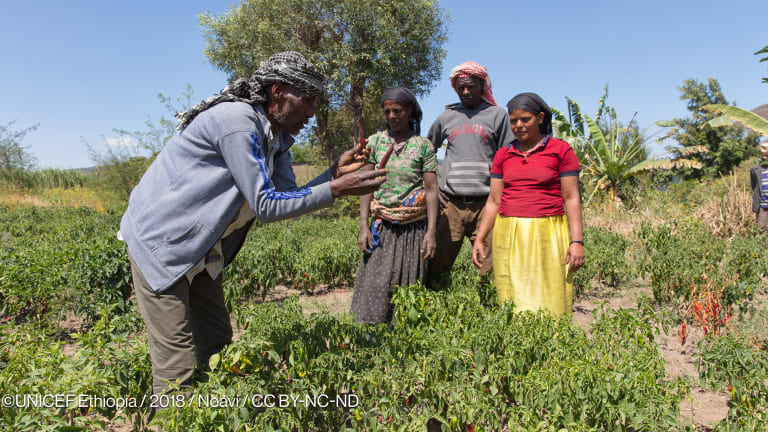
KIGALI, Rwanda — With 60 percent of the world’s uncultivated arable land and a population that is expected to exceed 1.5 billion by 2050, the pressure to transform Africa’s agriculture sector to meet the continent’s food needs is ever more urgent.
The latest Africa Agriculture Status Report, released Wednesday on the opening day of the African Green Revolution Forum in Kigali, suggests African nations must act now to deliver reforms around access to land and markets, extension services, and private sector investments in order to unlock their agricultural potential. It emphasizes the importance of long-term government commitment coupled with strong policies to attract foreign investment as critical to the sector’s overall advancement.
See more on agriculture in Africa:
► Opinion: We can make agricultural work attractive for Africa's youth. Here's how.
► With 2 new initiatives, AfDB's 'Feed Africa' strategy takes shape
► Agritech startups aim to lift Nigerian smallholder farmers out of poverty
The push for a “green revolution” in Africa follows on the example of Asian nations such as Taiwan and Singapore, which used agriculture to encourage broad economic growth. However, emulating their successes requires adaptation to the African context, experts told Devex. While in Asia, the agricultural revolution focused on inputs such as seeds and fertilizers alongside services, very little attention was placed on the central role of governments in driving change.
“Governments are a very critical partner but always the weakest link in the partnership,” explained Boaz Keizire, head of policy and advocacy at the Alliance for a Green Revolution in Africa, a nonprofit focused on lifting smallholder farmers out of poverty.
Keizire, one of the reports co-authors, shared five examples of government-led initiatives that can help boost the sector, including: A widely-communicated agricultural vision, strategy and implementation plan; an enabling business environment; local capacity to deliver services; coordination between farmers, civil society, private sector and relevant ministries of government; and mutual accountability to deliver on promises and minimize corruption.
While fertilizers can address land degradation issues and seed varieties could improve productivity challenges, Keizire argued that governments are the missing link that ties all efforts together.
“Governments think they have what it takes but what they lack is the incentive to know how to measure and communicate progress,” he said, also pointing to insufficient policy changes that benefit smallholder farmers.
At the meeting in Kigali this week, African leaders and stakeholders are taking stock of successes since last year’s meeting, and discussing how best to advance the green revolution. Delegates include the presidents of Rwanda, Kenya, Ghana, and Gabon. Turning smallholder farmers into the agribusinesses of the future is a key focus of this year’s forum, which is supported by organizations including the African Union Commission, African Development Bank, and United Nations Food & Agricultural Organization.
A continental framework for agricultural success
An Africa-wide framework known as the “Comprehensive African Agricultural Development Programme” was drafted in 2003 to serve as a blueprint on how to accelerate agricultural growth on the continent. It recommends an allocation of at least 10 percent of national budgets for agriculture, and 1 percent of agricultural income to be spent on agricultural research. Progress on CAADP in each country is measured biennially.
All African heads of state have agreed to CAADP and used it as the basis of domestic strategies. However, very few countries have come close to meeting these targets.
Countries such as Ethiopia and Rwanda were commended during the AAS report launch for their dedication to the sector.
For more than 25 years, the Ethiopian government has placed agriculture at the center of its development policy agenda. Public investments, such as in farmer trainings and sector modernization — largely focused on extension services in rural areas and improving productivity — helped to drive down rural poverty by half.
In Rwanda, more than two-thirds of the country relies on agriculture for work. Support for the sector has been critical for job creation, poverty reduction, and increased rural incomes. The country’s National Agricultural Policy has prioritized technologies that increase yields, reduce post-harvest losses and improve quality, along with climate-smart and nutrition-sensitive approaches. Policy reforms have helped to attract investments in diversified products such as horticulture, dairy, poultry, pork, and fish production.
Ghana was also highlighted in the report for its “Planting for Food and Jobs” program, which provides services to enhance the knowledge of farmers, then encourages them to adopt certified seeds and fertilizers in their activities. It further commends the West African country for its investment in evidence-based policies, supportive institutions, and institutionalized mechanisms for mutual accountability and peer review.
When the program was established some 15 years ago, many government officials had no vision of what making progress looked like, Keizire explained. But with countries now seeing the success of their commitments, it should incentivize other countries to take heed.
“Doing business as usual without changing and making big decisions and big ideas, Africa will remain poor, remain importing food, remain vulnerable to climate change, won’t have enough seeds [and] fertilizer, and will continue producing substandardly to what people can eat,” Keizire argued.
Devex is on the ground at the Africa Green Revolution Forum in Kigali. Follow reporter Christin Roby on Twitter for updates, and keep an eye out for more stories to follow.








